Persepolis (2007): more valid than ever | más vigente que nunca [ENG | ESP]
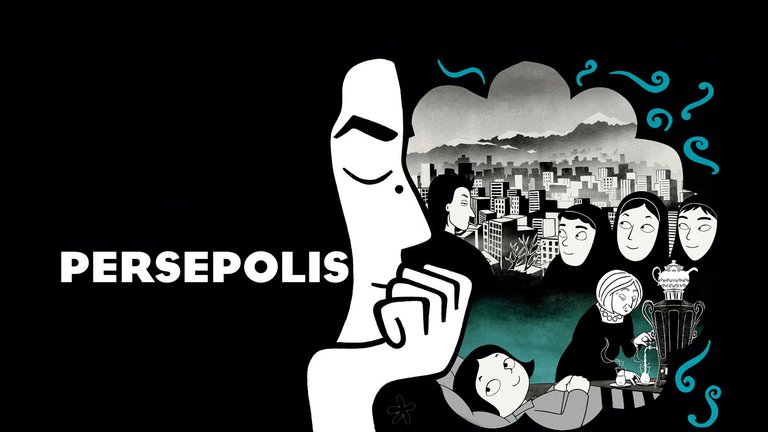
I like to read and I like to go to the movies. Books and movies are my main sources, not only for fun and entertainment, but also for reflection and questioning. And just as I believe that rereading is the real reading, I think that watching a movie a second time is even better. You no longer have the surprise of the first time, but I think of that quote from David Gilmour (the film critic, not the Pink Floyd member) who said: "… the second time you see something is really the time. You need to know how it ends before you can appreciate how beautifully it's put together from the beginning".
Me gusta leer y me gusta ir al cine. Libros y películas son mis fuentes principales, no sólo de diversión y esparcimiento, sino también de reflexión y cuestionamiento. Y al igual que creo que la relectura es la verdadera lectura, pienso que ver una película por segunda vez es aún mejor. No se cuenta ya con la sorpresa de la primera vez, pero pienso en aquella frase de David Gilmour (el crítico de cine, no el integrante de Pink Floyd) que dijo: "La segunda vez que ves algo es realmente la primera vez. Solo sabiendo cómo acaba algo se puede apreciar lo bien montado que está desde el principio".
For that reason there are books that I like to reread (sometimes several times) and movies that I revisit after some time has passed. In this case it was not due to an exercise in film criticism but for another reason. I am participating in a feminist book club in which over the course of four months we will discuss four books written by women and featuring gender perspectives. The third work on the list was Persepolis, the graphic novel by Marjane Satrapi, through which we explore racism, xenophobia and the condition of women in the midst of authoritarian governments, theocratic or not. So after having read this great work and a couple of days before discussing it with my club mates I decided to revisit the 2007 film, which I had seen - if I remember correctly - at least ten years ago. Revisiting it after knowing the graphic novel, but especially after having lived, read, seen, thought, analyzed and known so many other things, made me appreciate it even more and made me notice certain details and analyze some things that certainly must have passed unnoticed before my eyes that first time. It would seem that the selection of this text had been thought according to the current crisis in the Middle East, but the club's schedule had already been fixed since the beginning of the year, so the fact that Iran is again being discussed at the time we have read the comic is one of those coincidences with which life often tempts us to think that they don't exist.
Por esa razón hay libros que me gusta releer (a veces varias veces) y películas que vuelvo a visitar después de pasado algún tiempo. En este caso no se debió a un ejercicio de crítica cinematográfica sino a otro motivo. Estoy participando en un club de lectura feminista en el que a lo largo de cuatro meses conversaremos sobre cuatro libros escritos por mujeres y que presentan perspectivas de género. La tercera obra en la lista era Persépolis, la novela gráfica de Marjane Satrapi, a través de la cual exploramos el racismo, la xenofobia y la condición de la mujer en medio de gobiernos autoritarios, teocráticos o no. Así que luego de haber leído esta gran obra y un par de días antes de discutirla con mis compañeras del club decidí volver a ver la película de 2007, la cual había visto - si recuerdo bien - hace al menos diez años. Volver a visitarla después de conocer la novela gráfica, pero sobre todo después de haber vivido, leído, visto, pensado, analizado y conocido tantas otras cosas, me hizo apreciarla aún más y me hizo reparar en ciertos detalles y analizar algunas cosas que sin duda debieron pasar inadvertidas ante mis ojos aquella primera vez. Pareciera que la selección de este texto hubiera sido pensada de acuerdo a la crisis actual que hay en el medio oriente, pero la programación del club ya estaba fijada desde principios de año, con lo que el hecho de que nuevamente se esté hablando de Irán en el momento en que hemos leído el cómic es una de esas casualidades con la que la vida suele tentarnos a pensar que no existen.
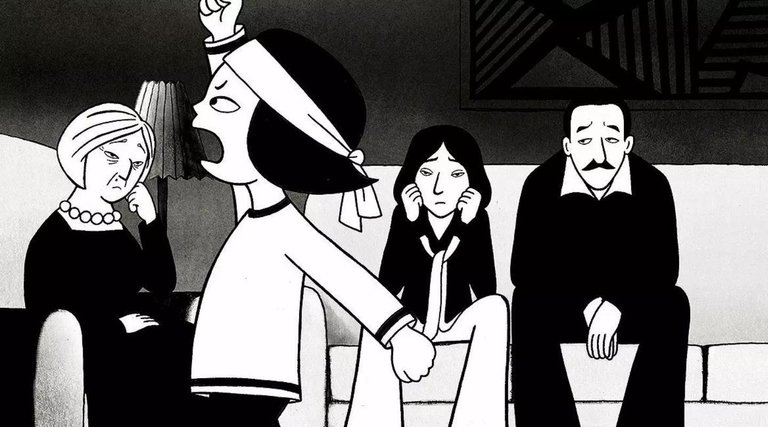
I've seen several adaptations of graphic novels and although there are some that are presented in live action with quite good results, such as Le bleu est une couleur chaude or Poulet aux prunes (by the same writer of Persepolis), I always prefer those that are adapted in animated format taking as a reference the same illustration style of the original work because it gives me the feeling that the book literally came to life, a bit like those pictures of the magical world of Harry Potter.
He visto varias adaptaciones de novelas gráficas y aunque hay algunas que son presentadas en live action con bastante buen resultado, como Le bleu est une couleur chaude o Poulet aux prunes (de la misma escritora de Persépolis), siempre prefiero aquellos que son adaptados en formato animado tomando como referencia el mismo estilo de ilustración de la obra original porque me genera la sensación de que el libro literalmente cobró vida, un poco como esas fotografías del mágico mundo de Harry Potter.
And that happens with Persepolis because Marjane Satrapi herself, creator of the comic book, wrote the screenplay and directed the film together with Vincent Paronnaud; moreover, an important addition is that the story is autobiographical. Marjane tells us here her own story from the time she was a ten-year-old Iranian girl when the Islamic revolution and the fundamentalists took power, forcing society to return to certain retrograde values such as forcing women to wear veils and political persecutions in the name of order and good manners. Thousands of people imprisoned, disappeared, murdered, the war between Iraq and Iran, migration, exile and the loss of freedoms, is the backdrop against which little Marjane discovers the world: punk music, ABBA, Iron Maiden, literature and later, love. Once a culturally advanced society and respected in the rest of the continent and the world, the arrival of theocracy plunges Iran into a climate of conflict and oppression, and turns its citizens into victims, pariahs, accomplices or outcasts, depending on the eye of the beholder. Thanks to the purchasing power of her parents, Marjane manages to go to live in Europe for a few years and there she gets to know another culture, very different from that of her country, and although she has more favorable conditions for her development, she also discovers the nostalgia and identity crises of all migrants who no longer inhabit the land to which they belong and who still don't belong to the one they now inhabit; and perhaps never will.
Y eso sucede con Persepolis porque la propia Marjane Satrapi, creadora del cómic, escribió el guion y dirigió la película junto a Vincent Paronnaud; además, un agregado importante es que la historia es autobiográfica. Marjane nos cuenta aquí su propia historia desde que era una niña iraní de diez años cuando la revolución islámica y los fundamentalistas tomaron el poder, forzando a la sociedad a volver a ciertos valores retrógrados como el obligar a las mujeres a llevar velo y además con persecuciones políticas en nombre del orden y de las buenas costumbres. Miles de personas encarceladas, desaparecidas, asesinadas, la guerra entre Irak e Irán, la migración, el exilio y la pérdida de las libertades, es el telón de fondo sobre el cual la pequeña Marjane descubre el mundo: la música punk, ABBA, Iron Maiden, la literatura y posteriormente, el amor. Alguna vez una sociedad avanzada culturalmente y respetada en el resto del continente y del mundo, la llegada de la teocracia sume a Irán en un clima de conflicto y opresión, y convierte a sus ciudadanos en víctimas, parias, cómplices o marginados, según el ojo de quien los mire. Gracias al poder adquisitivo de sus padres, Marjane logra irse a vivir a Europa durante unos años y allí conoce otra cultura, muy diferente a la de su país, y aunque tiene condiciones más favorables para su desarrollo, también descubre la nostalgia y las crisis de identidad que tienen todos los migrantes que no habitan ya la tierra a la que pertenecen y que aun no pertenecen a la que ahora habitan; y quizás nunca lo hagan.
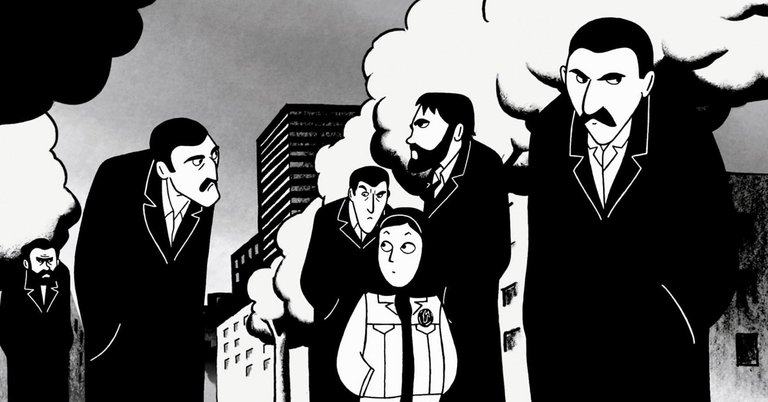
Marjane's story is full of very moving episodes, some of them cruel, painful and sad, but others very tender, hopeful and clearly funny. Disruptive from her earliest childhood, “Marji” had and has a way of questioning the world from her innocent look that makes us reflect on different things. The animated format of the story softens how disturbing certain scenes could be, but doesn't spare us the analysis of situations that should no longer be repeated in the history of our humanity and that, nevertheless, continue to happen.
La historia de Marjane está repleta de episodios muy emotivos, algunos crueles, dolorosos y tristes, pero otros muy tiernos, esperanzadores y claramente divertidos. Disruptiva desde su más tierna infancia, "Marji" tenía y tiene una forma de cuestionar el mundo desde su mirada inocente que nos hace reflexionar sobre diferentes cosas. El formato animado de la historia nos suaviza lo perturbadoras que podrían resultar ciertas escenas, pero no nos ahorra el análisis de situaciones que no deberían ya repetirse en la historia de nuestra humanidad y que, sin embargo, siguen pasando.
25 years after its first publication, Persepolis is still relevant, not so much because these things keep happening, but because it reflects on enduring and very human themes: family, parenthood, migration, xenophobia, authoritarianism, freedom, love, life, integration... each chapter of the novel and each scene of the film serve to talk for hours and hours about different aspects of our humanity. As an addition to the experience of the film, originally recorded with French voices, I found that Marjane is voiced by Chiara Mastroianni, actress daughter of an iconic couple, Marcello Mastroianni (La dolce vita and 8½) and Catherine Deneuve (Les parapluies de Cherbourg and Belle de jour), who voices her mother in the film. In addition to pursuing a successful career as a creator of graphic novels, human and women's rights activist, Marjane Satrapi has also directed other feature films, the latest being a biopic about Marie Curie, Radioactive, starring Rosamund Pike. Her latest editorial work, Femme, Vie, Liberté is a project coordinated by her in which through individual stories, portraits and vignette reports, different artists and experts speak out after the death of Mahsa Amadi at the hands of the moral police in Iran during the fall of 2022. I recommend reviewing all of Satrapi's work, but you can start with Persepolis, on paper and on screen, because I think hers it's a voice that deserves to be heard, read and spread, how many of you have seen this movie? have you read the comic? I read you in the comments.
A 25 años de su primera publicación, Persépolis sigue vigente, no tanto porque sigan pasando estas cosas, sino porque reflexiona sobre temas imperecederos y muy humanos: familia, paternidad, migración, xenofobia, autoritarismo, libertad, amor, vida, integración... cada capítulo de la novela y cada escena de la película sirven para conversar horas y horas sobre diferentes aspectos de nuestra humanidad. Como agregado a la experiencia de la película, grabada originalmente con voces en francés, encontré que la voz de Marjane la hace Chiara Mastroianni, actriz hija de una pareja icónica, Marcello Mastroianni (La dolce vita y 8½) y Catherine Deneuve (Les parapluies de Cherbourg y Belle de jour), quien hace la voz de su madre en la película. Además de seguir una exitosa carrera como creadora de novelas gráficas, activista por los derechos humanos y de las mujeres, Marjane Satrapi ha dirigido también otros largometrajes, siendo el último una biopic sobre Marie Curie, Radioactive, protagonizada por Rosamund Pike. Su último trabajo editorial, Femme, Vie, Liberté es un proyecto coordinado por ella en la que a través de historias individuales, retratos y reportajes en viñetas, diferentes artistas y expertos se pronuncian tras la muerte de Mahsa Amadi a manos de la policía de la moral en Irán durante el otoño de 2022. Recomiendo revisar toda la obra de Satrapi, pero pueden comenzar con Persepolis, en el papel y en la pantalla, porque creo que es una voz que merece ser oída, leída y difundida, ¿cuántos de ustedes han visto esta película? ¿han leído el cómic? Los leo en los comentarios.

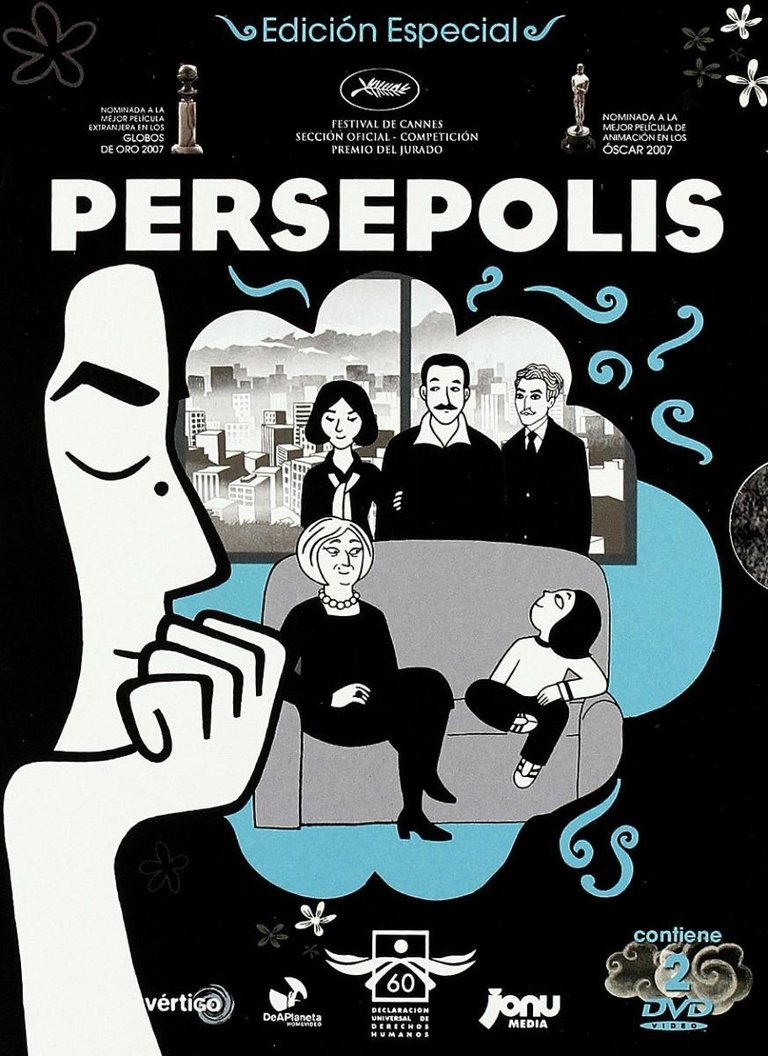


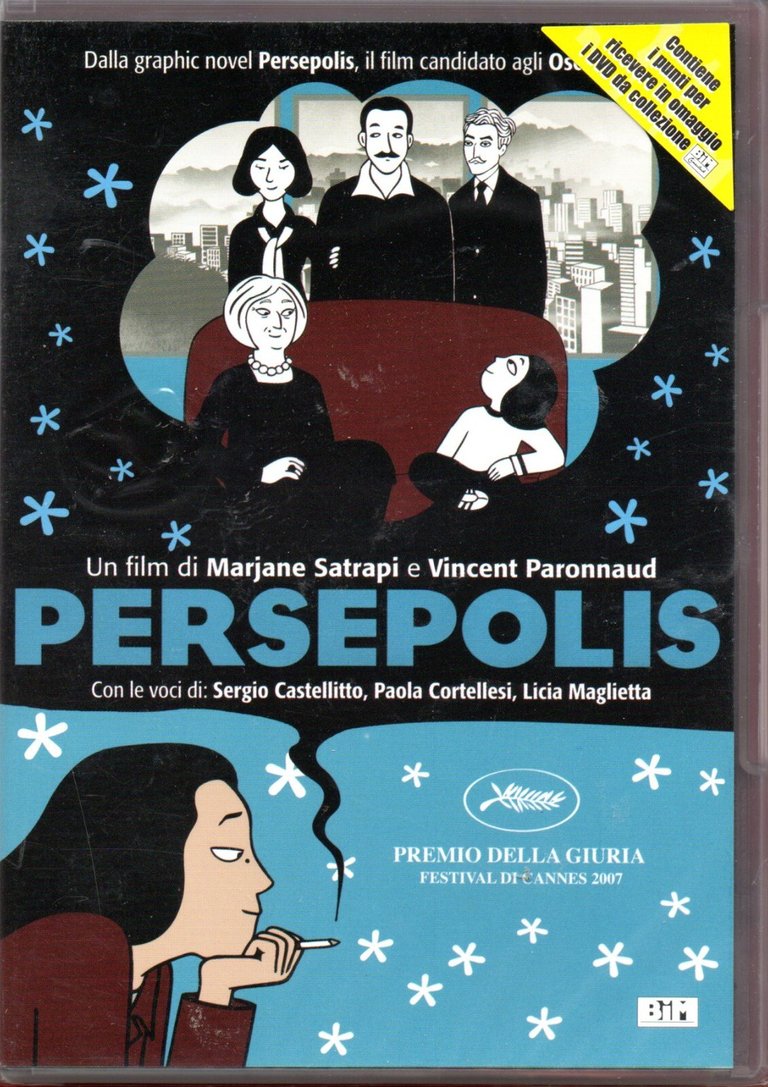
The film captures the essence of the comic very well, and the fact that Marjane Satrapi was involved in directing it gives it a very personal touch. It's true that the animation softens certain scenes, but it doesn't diminish the message. The themes it addresses are very relevant: xenophobia, authoritarianism, the loss of freedoms... and Marjane's story is very moving.
Yes, indeed. This is an incredible story everyone should know. Thank you for your comment
Good morning, happy Sunday. I see that your text not only informs but at the same time allows us to reflect. There is an interesting historical and emotional mix. Perhaps that back to the reading brings more clarity and flow. Excelent!
Sin duda que la lectura ayuda a profundizar lo visto en la pantalla y a extender las reflexiones. Por eso prefiero - cuando es posible - leer el libro antes de ver la película. Saludos y muchas gracias por el apoyo y por comentar.